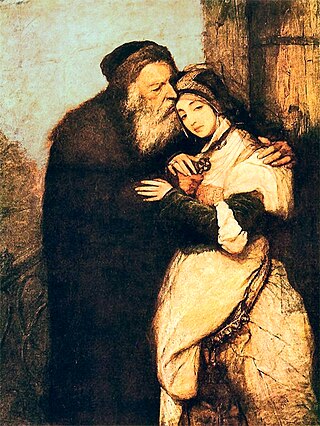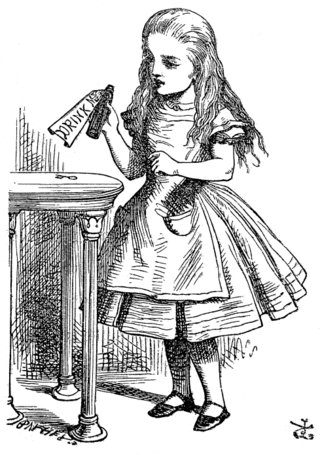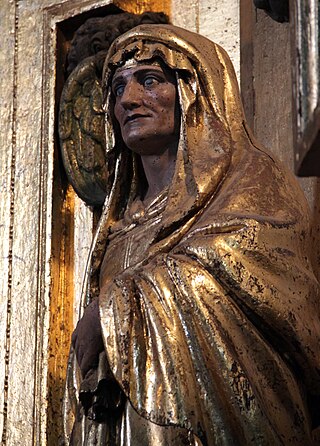Related Research Articles
Alexandra is a female given name of Greek origin. It is the first attested form of its variants, including Alexander. Etymologically, the name is a compound of the Greek verb ἀλέξειν and ἀνήρ. Thus it may be roughly translated as "defender of man" or "protector of man". The name Alexandra was one of the epithets given to the Greek goddess Hera and as such is usually taken to mean "one who comes to save warriors". The earliest attested form of the name is the Mycenaean Greek 𐀀𐀩𐀏𐀭𐀅𐀨, written in the Linear B syllabic script. Alexandra and its masculine equivalent, Alexander, are both common names in Greece as well as countries where Germanic, Romance, and Slavic languages are spoken.
Betty or Bettie is a name, a common diminutive for the names Bethany and Elizabeth. In Latin America, it is also a common diminutive for the given name Beatriz, the Spanish and Portuguese form of the Latin name Beatrix and the English name Beatrice. In the 17th and 18th centuries, it was more often a diminutive of Bethia.
Adele is a feminine given name meaning 'nobility'. It derives from German Adel meaning 'nobility' or adal, 'noble'. In Italy its name day is 24 December in honor of Adela of Pfalzel.
Natasha is a name of Russian origin. It is the diminutive form of the Latin name Natalia, which means "born on Christmas Day".
Amanda is a Latin feminine gerundive name meaning, literally, "she who must be loved". Other translations, with similar meaning, could be "deserving to be loved," "worthy of love," or "loved very much by everyone." Its diminutive form includes Mandy, Manda and Amy. It is common in countries where Germanic and Romance languages are spoken.

Sarah is a common feminine given name of Hebrew origin. It derives its popularity from the biblical matriarch Sarah, the wife of Abraham and a major figure in the Abrahamic religions. It is a consistently popular given name across Europe, North America, and the Middle East — being commonly used as a female first name by Jews, Muslims, and Christians alike, and remaining popular also among non-religious members of cultures influenced by these religions.
Megan is a Welsh feminine given name, originally a diminutive form of Margaret. Margaret is from the Greek μαργαρίτης (margarítēs), Latin margarīta, "pearl". Megan is one of the most popular Welsh-language names for women in Wales and England, and is commonly truncated to Meg.
Bella is a feminine given name. It is a diminutive form of names ending in -bella. Bella is related to the Italian, Spanish, Greek, Portuguese and Latin words for beautiful, and to the name Belle, meaning beautiful in French.

Jessica is a female given name of Hebrew origin.

Alice is a feminine first name with roots in the French and German languages.
Natalie or Nathaly is a feminine given name derived from the Latin phrase natale domini, meaning "birth of the Lord". Further alternative spellings of the name include Nathalie, Natalee, and Natalia/Natalija.

Jennifer, also spelled Jenifer or Jenefer, is a feminine given name, the Cornish form of Guinevere, that became popular in the English-speaking world in the 20th century.

Stephanie is a female name that comes from the Greek name Στέφανος (Stephanos) meaning "crown, wreath, garland". The male form is Stephen. Forms of Stephanie in other languages include the German "Stefanie", the Italian, Czech, Polish, and Russian "Stefania", the Portuguese Estefânia, and the Spanish Estefanía. The form Stéphanie is from the French language, but Stephanie is now widely used both in English- and Spanish-speaking cultures.
Charlotte is a feminine given name, a female form of the male name Charles. It is of French or Italian origin, meaning "free man" or "petite". It dates back to at least the 14th century. Other variants of the name and related names include Charlie, Lottie, Lotte, Chara, Karlotta, Carlota, and Carlotta.

Emma is a feminine given name. It is derived from the Germanic word ermen, meaning "whole" or "universal". It likely originated as a short form of names such as Ermengarde or Ermentrude. Its earliest use begins at least from the early seventh century, with Frankish royal daughter Emma of Austrasia and the wife of Eadbald of Kent found in written sources. Its popularity in the medieval era increased because it was the name of Emma of Normandy, mother of Edward the Confessor. Emmeline is a Norman variant of Emma that was introduced to England by the Norman invaders in the 11th century. The name is etymologically unrelated to Amalia, Amelia, Emilia, and Emily, all of which are derived from other sources, but all of these names have been associated with each other due to their similarity in appearance and sound. Emma has been used as a short form of some of these names or shares diminutives such as Em or Emmy with them.
Claudia is a female given name equivalent to Claudius or Claudio. In Portuguese, it is accented Cláudia. A variant and cognate form is Klaudia. It was originally used to refer to any woman who belonged to the ancient Roman Claudia gens. Claudia is a common name in countries that speak Germanic languages and Romance languages.

Naomi or Noemi is a given name of separate biblical Hebrew and Japanese origin used in various languages and cultures.
Caroline is a feminine given name, derived from the masculine name Charles. Common nicknames and variations include Callie, Cara, Carol, Carole, Carolina, Carolyn, Carly, Carrie, and Caz.
Carrie is a female given name in English speaking countries, usually a pet form of Caroline or Carolyn. Other spellings include Cari, Kari, Karie, Kerry, Carri, Karri, Kerrie, Kerri, Keri, Cerry, and Karrie, as well as various other spellings. Related names may include Carol, Caroline, Carolyn, Carolyne, or Carolynne.
Liza is primarily a feminine given name. It is sometimes used as a nickname for Elizabeth, Eliza and Luiza.
References
- ↑ Baby Names. Dorling Kindersley. 2010. p. 19. ISBN 9781405366328.
- ↑ "Cheryl - meaning - Baby Name Cheryl meaning and Horoscope". Indian Astrology. Retrieved 17 February 2023.